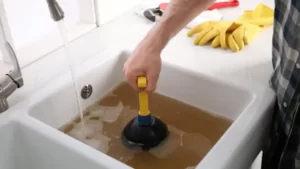Are you tired of dealing with clogged drains and the hassle they bring? It’s time to take control of your drain health and prevent future clogs from happening. In this blog, we will delve into the causes of clogs and help you understand why they occur in the first place. We’ll cover everything from the accumulation of solid waste to other common culprits. But don’t worry; we won’t leave you hanging with just the causes. We will also provide you with effective preventive measures and natural remedies that you can implement to keep your drains flowing smoothly. And if all else fails, we’ll guide you when it’s time to call a professional plumber for assistance. Say goodbye to clogged drains once and for all!
Understanding the Causes of Clogs
Here are some common causes of clogs:
- Accumulation of debris: One of the primary causes of clogs is debris buildup over time. This can include hair, soap scum, food particles, grease, and other materials that go down drains. Over time, these substances can accumulate and form blockages.
- Foreign objects: Objects not meant to be flushed or drained can cause clogs. This includes baby wipes, sanitary products, cotton balls, paper towels, and other non-biodegradable materials. Washing these items down the toilet or allowing them to go down the drains can lead to blockages.
- Mineral deposits: In areas with hard water, mineral deposits can build up inside pipes over time. These deposits, mainly consisting of minerals like calcium and magnesium, can reduce the diameter of the pipe and restrict water flow, eventually causing clogs.
- Plumbing pipe design: Poorly designed plumbing systems can also contribute to clogs. Pipes with inadequate slope or improper alignment can impede water flow and allow debris to accumulate in certain areas, leading to blockages.
- Grease and fat: Pouring cooking grease, fat, or oil down the drains may seem convenient, but it can cause significant clogs. Grease solidifies as it cools down, clinging to the inside of pipes and narrowing the passageways for water flow.
- Insufficient pipe diameter: Pipes that are too narrow or have a smaller diameter than required can be prone to clogging. Smaller pipes can quickly become overwhelmed with debris or larger objects, resulting in blockages.

Accumulation of Solid Waste
To maintain the long-term health of your drains and prevent the accumulation of solid waste, you can take several preventive measures. Firstly, avoiding pouring cooking grease, oil, and leftover food down the drain or garbage disposal is crucial. Instead, dispose of them properly in the garbage to prevent clogs and blockages from occurring. Another effective method for removing buildup and keeping your drains clear is by using drain screens. These screens act as a barrier, catching debris and preventing it from entering the drainage system.
In addition to these preventive measures, regular cleaning of your drains using a mixture of vinegar and baking soda can help break down any grime or odors that may have built up over time. Simply pour the mixture down the drain, let it sit for a few minutes, and then flush it with hot water. It is also recommended to schedule professional drain inspections and cleanings regularly. By doing so, any potential issues can be identified and resolved promptly before they become significant problems. Following these preventive measures will help ensure that your drain system remains clean and clog-free for the long term, saving you time, money, and potential headaches in the future.
Implementing Preventive Measures
To ensure your drains’ long-term functionality and efficiency, it is crucial to implement preventive measures. Regular drain cleaning should be a part of your routine maintenance as it helps prevent the accumulation of debris and potential clogs. You must be mindful of what you dispose of down the drain, avoiding substances like grease or food scraps that can solidify and obstruct the pipes.
Installing drain screens or stoppers can serve as an effective barrier, capturing hair, soap scum, and other particles before they can enter the drainage system. Flushing your drains regularly with hot water and vinegar can break down residue and maintain clear pipes. Enzyme-based drain cleaners are another option for keeping your drains clean and free-flowing by breaking down organic materials.
Additionally, scheduling professional inspections and maintenance for your drains can help identify any potential issues early on and prevent significant problems in the future. By following these preventive measures, you can ensure that your drains remain clear and free from clogs, promoting the overall health of your plumbing system. This will save you from costly repairs and inconveniences down the line. Remember that prevention is key to maintaining efficient drainage systems in your home or business.
Natural Remedies for Clogs
Proper maintenance of drains is vital for preventing clogs and maintaining optimal functionality. In the case of minor clogs, natural remedies like baking soda and vinegar can be effective solutions. These ingredients can help break down debris and clear the pipes. However, it is crucial to avoid pouring grease, oil, or other substances down the drain as they can contribute to blockages. Instead, appropriately dispose of these materials. Installing drain guards is another proactive step you can take to prevent clogs.
These guards catch hair and debris before they enter the pipes, reducing the risk of blockages. Additionally, enzymatic cleaners are highly effective in breaking down organic matter that may accumulate in drains over time. By implementing regular maintenance practices and utilizing these natural remedies, you can ensure long-term drain health and prevent costly plumbing issues. Remember to consult a professional plumber if you encounter persistent or severe clogs that these methods cannot resolve.
Common Mistakes to Avoid When Maintaining Your Drains
Maintaining your drains is essential to prevent clogs, backups, and other plumbing issues. However, there are some everyday things that people need to correct when maintaining their drains. Here are a few mistakes you should avoid:
- Using chemical drain cleaners excessively: While chemical drain cleaners can effectively clear minor clogs, they should not be used as a regular maintenance method. These cleaners contain harsh chemicals that can damage your pipes over time. Instead, opt for natural alternatives like baking soda and vinegar, or use a plunger or drain snake to clear clogs.
- Neglecting regular cleaning: Regular cleaning is crucial to prevent buildup and clogs in your drains. Avoid failing this task. Clean the drains with a mixture of hot water and mild soap, or use a combination of baking soda and vinegar to keep them clear and fresh.
- Flushing inappropriate items: Your drains are designed to handle specific waste, such as toilet paper and human waste in toilets, and food particles in kitchen sinks. Flushing things like wet wipes, feminine hygiene products, cotton balls, and paper towels or pouring grease down the sink can lead to clogs and blockages. Dispose of these items correctly in the trash.
- Ignoring signs of a problem: Be attentive to any signs of drainage issues such as slow draining, gurgling sounds, foul odors, or water backups. Ignoring these signs can worsen the problem and lead to more severe damage. Address the issues promptly to prevent costly repairs.
- Overloading your garbage disposal: While garbage disposals are convenient for grinding food waste, they have limitations. Avoid overloading your garbage disposal with large quantities of food or fibrous items like potato peels, celery, or coffee grounds. This can strain the disposal and lead to clogs or motor failure.
- Not seeking professional help when needed: If you’re facing persistent drain issues or have tried DIY methods without success, it’s best to seek professional help. Plumbers have the expertise and specialized tools to handle complex drain problems and can prevent further damage.
When to Call a Plumber?
Here are some situations where it’s typically a good idea to contact a professional plumber:

- Leaking Pipes: If you notice any water leakage from pipes in your home, it’s essential to have a plumber assess the situation. Leaks can cause damage to your property and may indicate an underlying plumbing problem.
- Clogged Drains: If your sinks, showers, or toilets are constantly clogged, and basic DIY methods don’t resolve the issue, a plumber can help clear the blockage using specialized tools.
- Low Water Pressure: If the water pressure in your home is consistently low, despite cleaning the aerators and checking the valves, a plumber can investigate the cause and recommend solutions.
- Burst Pipes: If a pipe has burst in your home, it’s crucial to shut off the main water supply and call a plumber immediately. Burst pipes can cause extensive water damage and require immediate professional attention.
- Water Heater Problems: If your water heater is malfunctioning, leaking, or not providing sufficient hot water, a plumber can diagnose and repair the issue or suggest a replacement if necessary.
- Sewer Line Issues: If you notice sewage odors, gurgling sounds, or water backups in your drains or toilets, it could indicate a problem with your sewer line. Plumbers have the tools and expertise to inspect and repair sewer line issues.
- Installation of Plumbing Fixtures: When installing new plumbing fixtures, such as toilets, sinks, or showers, it’s generally a good idea to have a plumber handle the installation to ensure proper connections and prevent leaks.
- Remodeling or Renovations: If you’re planning a bathroom or kitchen remodel that involves plumbing modifications or structures, a plumber can help with the design, ensure compliance with building codes, and do the necessary plumbing work.
Conclusion
In conclusion, maintaining long-term drain health is essential to prevent future clogs and plumbing issues. You can keep your drains clear and functional by following a few simple tips, such as avoiding chemical drain cleaners, regularly cleaning your drains, and being mindful of what goes down them. Remember to use drain strainers, promptly address drainage problems, and seek professional help. With these practices, you can ensure the longevity and efficiency of your drains. If you need assistance with drain solutions in Braintree, MA, contact Clear Choice Drain Solutions for professional help and expert guidance.
